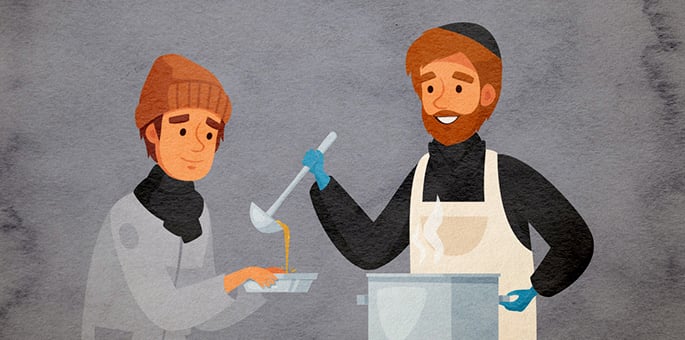There is a time-hallowed custom to taste the Shabbat food on Friday afternoon. The earliest record of this custom is in the Machzor Vitry,1 by Rabbi Simcha of Vitry (d. 1105), who says in the name of the Talmudic sages that “whoever tastes from the Shabbat dishes prior to Shabbat will live a long life.”2
Apparently drawing from a nonextant version of the Jerusalem Talmud, he explains that this ensures that the food isn’t burned, or as others3 put it, it ensures the food has the proper spices “so it will be eaten with delight.”
Making sure that everything is “just so” before Shabbat is based on the verse “Then you shall know that there is peace in your tent . . .”4 Through verifying that the food is tasty and properly cooked, we ensure that peace will reign on Shabbat.5
Others provide a different reason: Adding spice to a hot dish on Shabbat can be complex since the spices might “cook” in the hot food. Thus, we make sure everything is properly spiced beforehand.6
Royal Dishes
In our Shabbat prayers, we say, “V’toameha chaim zachu” (“And those that taste [Shabbat] shall merit life”). Rabbi Yitzchak Luria (the Arizal) sees this as an allusion to the idea that we should taste the Shabbat food on Friday. 7
Additionally, he explains, this is compared to one who is preparing a feast for royalty. The chef will certainly taste every dish to make sure it isn’t missing anything and is fit for the king, and thus we do the same.8
You Need Not Taste Much
Most have the custom of just tasting a bit of the food prepared for Shabbat, not necessarily sampling each dish. The assumption is that those who are cooking the food know what they’re doing, so we taste the food primarily due to mystical reasons.9
Although one need not eat a substantial amount of each dish, it should be more than a “mere taste” so that one can make a proper blessing before eating.10
The Rebbe remarked that he never observed his predecessor, the Sixth Rebbe, actually tasting the foods prepared for Shabbat. However, the Rebbe asserted that he certainly did so spiritually, tasting the spiritual delight of Shabbat even before Shabbat began.11
A Taste of the World to Come
The mystics explain that just as we enjoy a taste of the weekly “micro-Shabbat,” so too do we enjoy a taste of the “macro-Shabbat,” the era of Moshiach, referred to as “the day that is all Shabbat.”12
The Talmud tells us that our history comprises six epochs of one thousand years each, with every thousand years corresponding to another day of the week. The seventh millennium, the era of Moshiach, corresponds to Shabbat.
In that era, the “righteous” will partake in a “feast,” referring to the pleasure and delight of learning the deep, mystical secrets of the Torah that will be revealed at that time. As we are now in the second half of the sixth millennium (the Jewish year is currently 5783), which corresponds to the cosmic Friday afternoon, we must taste this “feast” prepared for Shabbat.
This is one reason why the Baal Shem Tov started teaching the deeper dimension of the Torah, the teachings of Chassidism, in the time corresponding to Friday afternoon.
This “taste” gives us the strength to persevere in the darkness of exile and itself hastens “the day that is all Shabbat.”







Start a Discussion